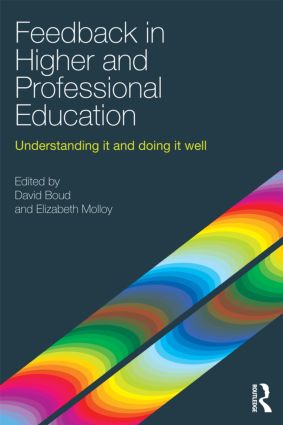Boud Molloy 2013
Feedback in Higher and Professional Education
1. Références
- Référence complète APA : Boud, D. & Molloy, E. (2013). Feedback in Higher and Professional Education. Londres : Routledge, 229 p.
- Auteur(s) : David Boud, Elizabeth Molloy.
2. Copies
- Copie électronique en ligne :
- Copie électronique locale :
- Copie physique CP :
- Copie physique en bibliothèque :
3. Mots-clés
4. Quart de couverture
Learners complain that they do not get enough feedback, and educators resent that although they put considerable time into generating feedback, students take little notice of it. Both parties agree that it is very important. Feedback in Higher and Professional Education explores what needs to be done to make feedback more effective. It examines the problem of feedback and suggests that there is a lack of clarity and shared meaning about what it is and what constitutes doing it well. It argues that new ways of thinking about feedback are needed. There has been considerable development in research on feedback in recent years, but surprisingly little awareness of what needs to be done to improve it and good ideas are not translated into action. The book provides a multi-disciplinary and international account of the role of feedback in higher and professional education. It challenges three conventional assumptions about feedback in learning: That feedback constitutes one-way flow of information from a knowledgeable person to a less knowledgeable person. That the job of feedback is complete with the imparting of performance-related information. That a generic model of best-practice feedback can be applied to all learners and all learning situations It seeking a new approach to feedback, it proposes that it is necessary to recognise that learners need to be much more actively involved in seeking, generating and using feedback. Rather than it being something they are subjected to, it must be an activity that they drive. (source: Nielsen Book Data)
5. Table des matières (facultatif)
- 1. The Problem with Feedback David Boud and Elizabeth Molloy
- 2. Changing Conceptions of Feedback David Boud and Elizabeth Molloy
- 3. Resituating Feedback from the Reactive to the Proactive David Nicol
- 4. The Impact of Emotions in Feedback Elizabeth Molloy, Francesc Borrell Carrio, Ron Epstei
- 5. Socio-cultural Considerations in Feedback Andrea Paul, Kara Gilbert, Louisa Remedios
- 6. Trust and Sustainable Feedback for the Development of Student Learning Dispositions David Carless
- 7. Written Feedback: What is it good for and how can we do it well? Brian Jolly and David Boud
- 8. Feedback in the Digital Environment Brett Williams, Ted Brown, Robyn Benson
- 9. Feedback on Skills in Simulation Debra Nestel, Roger Kneebone, Fernando Bello
- 10. Implementing Multisource Feedback Jocelyn Lockyer and Joan Sargeant
- 11. The Role of Peers in Feedback Processes Richard Ladyshewsky
- 12. Utilising the Voice of Others: The example of consumer-delivered feedback Lisa McKenna and Fiona Kent
- 13. Decision-making for Feedback David Boud and Elizabeth Molloy.
6. Résumé personnel (facultatif)
- Compte-rendu par Ph. Dessus : https://dms.revues.org/1129
7. Voir aussi
